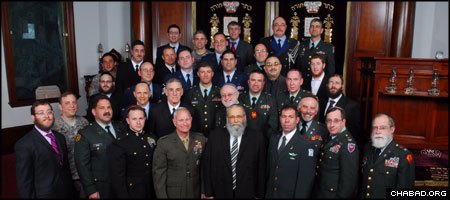Flying in from bases as far away as South Korea, Iraq and Kuwait, some 50 Jewish military chaplains and personnel bivouacked in South Florida this month for a conference on the unique role of the military rabbi.
Sponsored by the Aleph Institute, a Chabad-Lubavitch organization based in the Miami suburb of Surfside that provides for the spiritual needs of Jewish military personnel and prisoners, the Feb. 4 to 6 conference – which was titled “The Military Rabbi – Walking the Tightrope Without Losing One’s Balance” – was capped off by a Shabbat program of services and meals with the community at The Shul of Bal Harbour.
Wearing their battle dress uniforms during the workshops and their formal dress uniforms for the Thursday night reception and Shabbat dinner, the soldiers represented a cross section of America’s military forces. Members of the Air Force, Army, Marines and Coast Guard attended, as did chaplains from several State Defense Forces. The ranks of the participants ranged from captain to four-star general.
Drawing on teachings from the Torah, the seminar focused on implementing modern counseling practices in chaplaincy services. It also examined ethical and moral issues confronting the chaplaincy, whether in the realm of confidential communications, bioethical questions or crisis counseling.
“The weekend was excellent and well organized,” commented U.S. Army Col. Rabbi Jacob Goldstein. “It gave chaplains and their families a chance to talk and to share experiences, and many found that there are common issues in the military no matter where one is stationed.
“For instance,” he continued, pointing to one of the discussions, “soldiers who are not religious, but are searching, can find that observing Shabbat is very difficult. Senior chaplains at the seminary specifically addressed this issue.”
Military Matters
Rabbi Shalom B. Lipskar, director of The Shul at Bal Harbour and founder of the Aleph Institute, said that his congregation was inspired by the soldiers’ presence.
“The visual impact of seeing 50 commissioned officers in their official regalia and in the colors of their service is particularly powerful,” he explained. “These soldiers epitomize the self-sacrifice we talk so much about in Judaism. Seeing so many high-level Jews in the military who are not only extraordinary soldiers, but also add a Torah perspective and kindness to the profession, is very consoling.”
Recognized by the U.S. Department of Defense as an official Ecclesiastical Endorsing Agency empowered to credential military chaplains, the Aleph Institute kept a key eye on soldiering during the conference. The program guide for the gathering was written to suit the needs of the uniformed personnel, with the morning prayer service beginning promptly at “0845 hours” or 8:45 a.m. in civilian terms.
And while the bulk of the seminar was devoted to helping out fellow soldiers spiritually, workshops also looked at the everyday difficulties chaplains face in serving in a modern combat zone.
“The war on terror has redefined what it means to be on the frontline,” explained Rabbi Mendy Katz, Aleph’s director of programs. “The terrorist threat and insurgency component places every soldiers in harm’s way. In addition, the frequency and length of deployments keep soldiers away from home for years.
“Soldiers and chaplains alike are in combat every day,” he continued. “The constant need for vigilance against improvised explosive devices, for instance, leaves a person in a constant state of tension.”
Included among the panel of speakers was Gen. Robert Magnus, a retired assistant commandant of the U.S. Marine Corps, Dr. Samuel Kleinman, deputy undersecretary of defense for readiness, retired Maj. Gen. Jamie Barkin of the U.S. Army, and Rear Adm. Harold Robinson, the U.S. Navy’s deputy chief of chaplains for reserve matters and director of the Jewish Welfare Board-Jewish Chaplains Council. Professor Gerald August of Yeshiva University, a professional orator, gave a presentation on “the sermon as a pastoral act,” detailing the importance of connecting with and calming soldiers.
“Aleph has always been there for us,” said Capt. Rafael Bardugo, a chaplain based at McGuire Air Force Base in Trenton, N.J., and a conference attendee. “Their attention to every detail showed that their caring stretches to every Jewish soldier in the military.”
During the Shabbat lunch, Magnus – one of only four Jews to attain the rank of four stars in the history of the U.S. military – addressed the moral position of American forces in fighting a war on terror. During the services preceding the meal, he was called up to recite a blessing on the Torah.
“It was a very moving experience,” Stephen Fiske, a congregant from Boca Raton, said of the Shabbat portion of the conference. “In a day and age when anti-Semitism is so rampant around the world, Jewish soldiers can wear their uniforms and their head-coverings at the same time.”





Join the Discussion